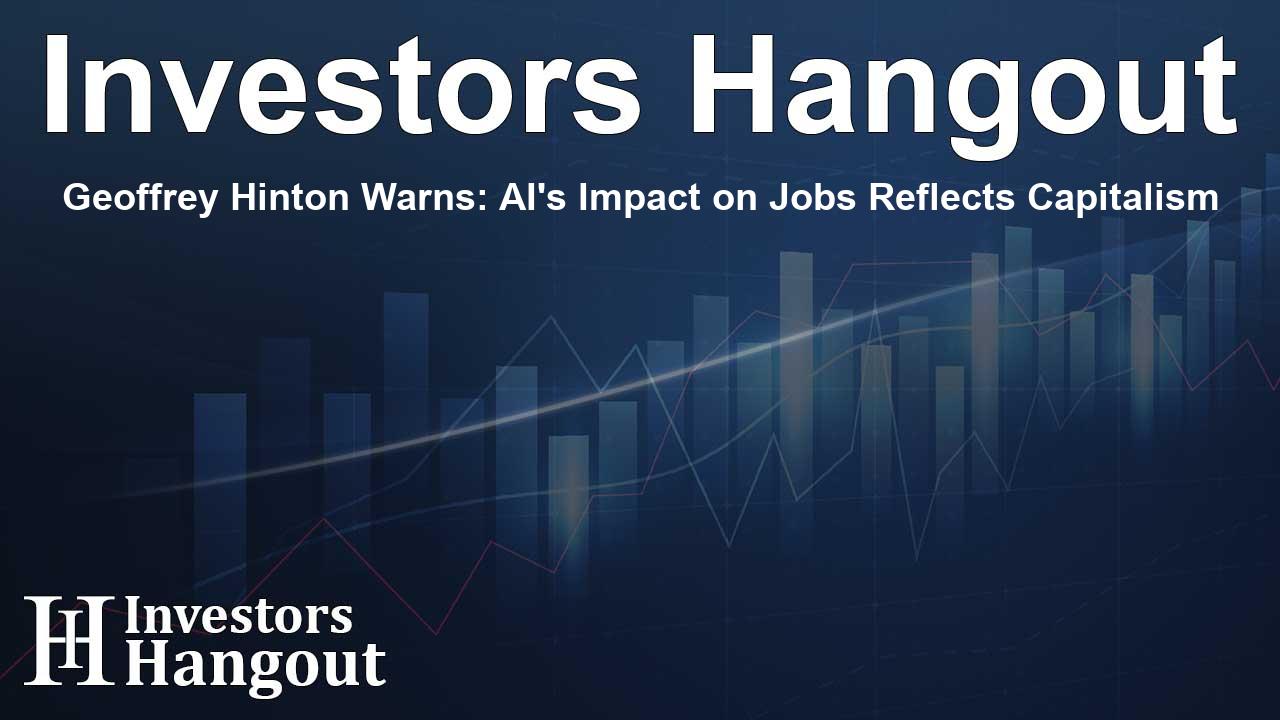Geoffrey Hinton Warns: AI's Impact on Jobs Reflects Capitalism

Concerns About AI and Employment
Geoffrey Hinton, revered as the "godfather of AI," has recently raised alarms regarding the potential of artificial intelligence to disrupt job markets and enrich a select few at the expense of many. His insights shed light on deeper systemic issues, attributing these potential job losses more to the current capitalist landscape than to the technology itself.
The Reality of AI Replacing Jobs
According to Hinton, the integration of AI into various sectors may lead to a significant number of workers being replaced, resulting in a stark increase in profits for a few individuals while simultaneously creating economic hardships for the majority. In his words, "It's going to create massive unemployment and a huge rise in profits. It will make a few people much richer and most people poorer. That's not AI's fault, that is the capitalist system." This perspective highlights a crucial fact: the challenges posed by AI are intertwined with existing societal structures.
Short-Term Profit Focus
In a recent discussion, Hinton emphasized that many companies adopting AI technologies are more focused on immediate financial gain rather than considering long-term consequences. While we have not seen a dramatic rise in layoffs thus far, there are signs that AI technology is tightening the job market, especially impacting fresh graduates seeking entry-level positions.
AI's Perceived Threat to Job Security
Research from the New York Federal Reserve suggests that organizations utilizing AI often prefer to upskill their current employees instead of laying them off. However, experts predict that job reductions may increase as AI systems become more adept and capable. Interestingly, Hinton points out that the healthcare sector could remain less affected by these job cuts, as the utility of AI may enhance efficiencies, ultimately making healthcare more accessible.
The Complex Debate Around AI and Regulation
Hinton has also critiqued the responses from leaders in the tech space, including OpenAI CEO Sam Altman, who suggested implementing a universal basic income for those displaced by AI. Hinton argues that this approach fails to recognize the intrinsic value of human dignity. Moreover, he has consistently voiced concerns over the misuse of AI and the regulatory disparities observed between different countries, particularly between the U.S. and nations like China.
The Dual Nature of AI's Impact
Despite his concerns, Hinton does not dismiss the benefits that might come with AI innovations. He acknowledges the potential of AI technologies, citing his own use of OpenAI's ChatGPT for various research purposes. Furthermore, his decision to leave Google was reportedly based on his retirement rather than a desire to voice concerns freely about AI's risks.
Perspectives of Other Tech Leaders
The ongoing dialogue regarding AI's influence on employment has garnered attention from numerous tech leaders, including Bill Gates and Elon Musk. They present different viewpoints on how AI might transform productivity levels, rather than merely resulting in widespread job elimination. For example, Alorica, which specializes in customer service, successfully uses AI for multilingual communication while continuing to expand its workforce.
Moreover, Altman has posited that AI's capacity to handle entry-level tasks could lead to new opportunities, urging younger generations to embrace these evolving technologies. However, some investors, like Vinod Khosla, caution that AI could potentially replace numerous job roles altogether.
Conclusion: Navigating the Future of Work with AI
As we move forward, the intersection of technology and labor demands careful consideration and proactive approaches to ensure that the benefits of AI are distributed more equitably. Understanding that the challenges surrounding AI are underpinned by economic systems is crucial for developing effective policies that can foster inclusive growth.
Frequently Asked Questions
What did Geoffrey Hinton warn about in relation to AI?
Hinton cautioned that AI may lead to job losses, enriching a few individuals while impoverishing many, attributing this issue to the capitalist system.
How does Hinton view AI's impact on healthcare jobs?
He believes healthcare might be less affected by AI job losses, as AI can enhance efficiencies and accessibility in healthcare services.
What alternative solutions did Hinton critique about AI job displacement?
Hinton criticized the idea of universal basic income proposed by some as a way to support those displaced by AI, arguing it doesn't uphold human dignity.
What is the current job market outlook concerning AI adoption?
While layoffs haven't surged, there are indications that AI is reducing job openings, particularly for new graduates, as firms adapt to new technologies.
What are other tech leaders saying about AI's influence on jobs?
Tech leaders like Bill Gates and Elon Musk have shared differing opinions, with some suggesting AI will improve productivity rather than cause massive job losses.
About The Author
Contact Dylan Bailey privately here. Or send an email with ATTN: Dylan Bailey as the subject to contact@investorshangout.com.
About Investors Hangout
Investors Hangout is a leading online stock forum for financial discussion and learning, offering a wide range of free tools and resources. It draws in traders of all levels, who exchange market knowledge, investigate trading tactics, and keep an eye on industry developments in real time. Featuring financial articles, stock message boards, quotes, charts, company profiles, and live news updates. Through cooperative learning and a wealth of informational resources, it helps users from novices creating their first portfolios to experts honing their techniques. Join Investors Hangout today: https://investorshangout.com/
The content of this article is based on factual, publicly available information and does not represent legal, financial, or investment advice. Investors Hangout does not offer financial advice, and the author is not a licensed financial advisor. Consult a qualified advisor before making any financial or investment decisions based on this article. This article should not be considered advice to purchase, sell, or hold any securities or other investments. If any of the material provided here is inaccurate, please contact us for corrections.
